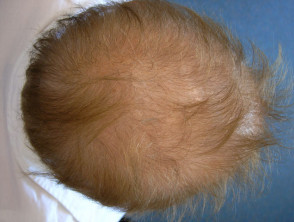DermNet provides Google Translate, a free machine translation service. Note that this may not provide an exact translation in all languages
Quiz
Hair loss – 14 cases
Diffuse hair loss
This quiz will test your diagnostic skills in diagnosing hair loss.
Diffuse hair loss from the scalp may present as an acute or subacute process without scarring, accompanied by shedding of telogen (bulb) or anagen (tapered) hairs, or more slowly as chronic thinning. In most cases, a careful history and examination reveals the cause. Where none is obvious, look for iron deficiency and thyroid disease.
Localised hair loss
A patient may present reporting one or more bald areas. This may or may not be accompanied by an inflammatory process with varying degrees of irritation, soreness, erythema, scaling and pustules and can be followed by permanent scarring (cicatricial alopecia). If scaling is present, a scraping should be arranged for mycology. It is often helpful to obtain one or more scalp biopsies from the active inflammatory edge. Refer to a dermatologist for specific diagnosis and management.
For each of the fourteen cases, study the image(s) and then answer the questions. You can click on the image to view a larger version if required.
Each case should take approximately 2 minutes to complete. There is a list of suggested further reading material at the end of the quiz.
When you finish the quiz, you can download a certificate.
Case 4
Sign up to the newsletter
© 2024 DermNet.
DermNet does not provide an online consultation service. If you have any concerns with your skin or its treatment, see a dermatologist for advice.
